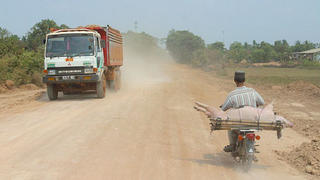
A friend of mine told me a story about piglets. A very poor community in Cambodia was part of a program to purchase little piglets. $5000 kitted out most home owners with one or two sows while a few boars were also owned at the community level. The piglets were cheaper than the adult animals and easier to transport. Months pass and the piglets become pigs. The sows are bred and soon more piglets are running about the township. Before long our villagers have enough stock to maintain breeding while also utilising the remainder for food. By selling some of their future production of piglets the initial $5000 is repaid to the program and another community is started on the concept.
The two key elements here are 1) increasing the communities own capacity to develop and sustain a better quality of life and 2) the money provided is not a handout but a loan and must be paid back.
Not every program will ever see the $5000 paid back, but the view is that handout money leads to fewer success stories than repayment money. To raise the piglets the villagers themselves had to contribute to the development costs, which establishes a comittment level far greater than any one off donation.
It's a nice story and of course poorly reflects the complexity and obstacles which impact most aid projects. Establishing strong governance around a project is often difficult in a country where corruption and bribery are a way of life. Not every community (or parts of a community) have the capacity to participate and develop - the very poorest people are sometimes unsuitable candidates for building self-sustaining programs.
In the face of such uncertainty about using aid to impact positive change the parable of the starfish is my only guide. The story goes that a monk and his novice were walking along the beach one morning. A terrible storm had swept through the night before and thousands of starfish were stranded on dry land, unable to reach the sea. Without warning the monk stopped walking and picked up a single starfish, carried it back to the sea and hence saved it's life. The young novice was incensed, "What good does that do? Just one starfish! There are thousands on this beach, most of them already have perished. You cannot save them all. What difference can it make to save just one starfish?" The monk simply replied, "It makes a difference to THAT starfish."
No comments:
Post a Comment